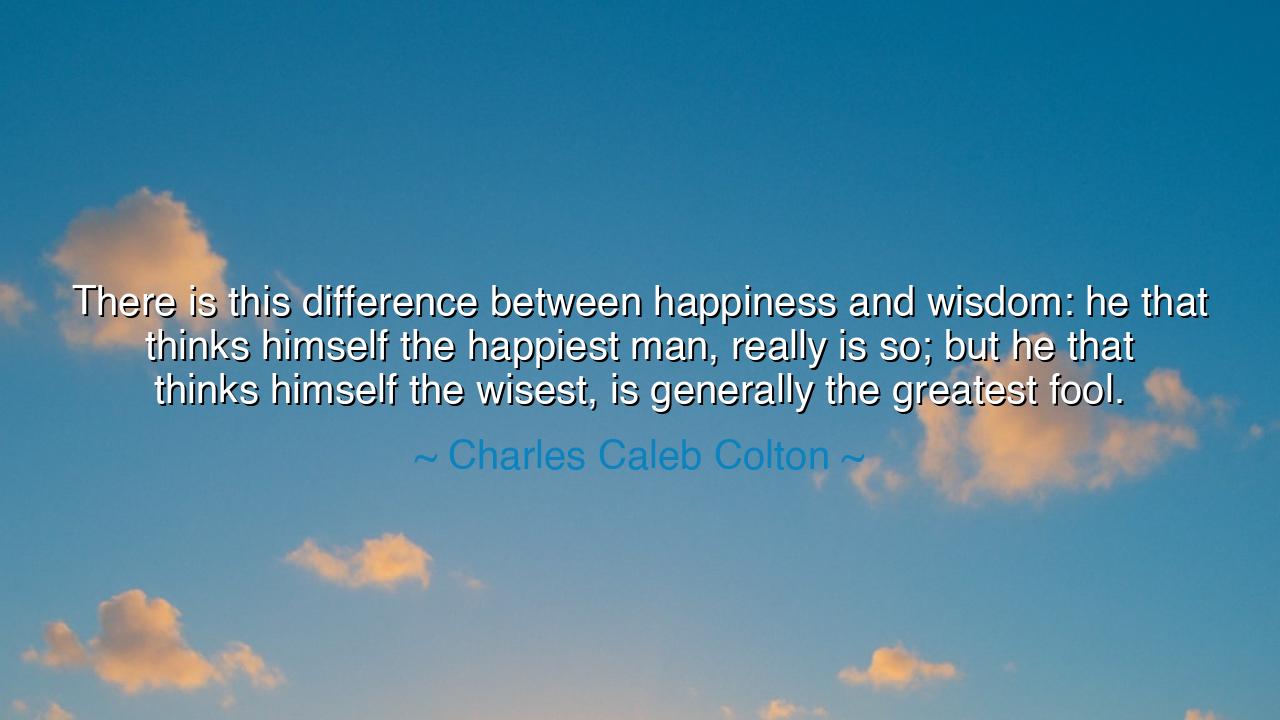
There is this difference between happiness and wisdom: he that
There is this difference between happiness and wisdom: he that thinks himself the happiest man, really is so; but he that thinks himself the wisest, is generally the greatest fool.






The words of Charles Caleb Colton—“There is this difference between happiness and wisdom: he that thinks himself the happiest man, really is so; but he that thinks himself the wisest, is generally the greatest fool”—shine like a double-edged blade of insight, cutting through the illusions of pride and perception. In these lines, Colton contrasts two great pursuits of humanity: happiness, the peace of the heart, and wisdom, the mastery of the mind. One, he suggests, is achieved through contentment; the other, often corrupted by arrogance. The man who believes himself happy truly possesses joy, for happiness is born of belief and gratitude. But the man who believes himself wise reveals not his enlightenment, but his blindness—for true wisdom begins with humility, and dies with vanity.
In the ancient spirit, this truth was known to philosophers and prophets alike. The Oracle of Delphi once declared that Socrates was the wisest of men, and when the philosopher heard this, he was perplexed. “If I am wise,” he said, “it is only because I know that I know nothing.” Thus, the very consciousness of ignorance became the mark of wisdom. In contrast, those who boasted of knowledge were shown to be fools, for their certainty blinded them to the infinite vastness of truth. Colton’s words are an echo of this eternal law: that the illusion of wisdom is the surest sign of folly, while the acceptance of limitation is the birth of understanding.
But happiness, in Colton’s eyes, is of a gentler nature. Unlike wisdom, it does not depend upon conquest or accumulation. It is not measured by comparison or intellect, but by one’s inward state. “He that thinks himself the happiest man, really is so.” These words hold the fragrance of simplicity—the same wisdom that radiated from the ancients who taught that happiness lies not in possessions, but in perception. For happiness is a choice, a quiet act of acceptance. The one who believes himself happy transforms his world into peace; the one who waits for the world to make him happy remains forever in want. Thus, happiness is not found—it is declared by the heart that dares to be content.
Colton, who lived in the early nineteenth century, was a man acquainted with both the grandeur and fragility of human ambition. A clergyman and essayist, he walked among thinkers and noblemen, observing the vanity of intellect and the folly of pride. His quote, born of experience, warns against the spiritual disease of self-deception. For he had seen many who sought wisdom as a crown to wear, not as a lamp to carry. Such men, swollen with learning but starved of humility, mistook knowledge for understanding and cunning for insight. And in their pride, they became the very fools they disdained.
History offers countless examples of this contrast. Consider King Solomon, who asked not for wealth, but for wisdom. The Lord granted his wish, and his name became synonymous with understanding. Yet in the twilight of his reign, even Solomon, the wisest of kings, fell into folly—trusting his power more than his principles, and his judgment more than his humility. In his later writings, he lamented that wisdom without reverence is vanity, “a chasing after the wind.” From his rise and fall, we learn Colton’s lesson: that wisdom, when claimed as possession, decays into arrogance, but happiness, when claimed as feeling, flourishes into truth.
The ancients would have said that wisdom dwells in the empty vessel, while happiness fills the full one. The wise man who knows his ignorance keeps learning; the happy man who believes in his joy keeps rejoicing. The difference lies in where each draws his strength. Happiness flows inward from the heart’s gratitude; wisdom flows outward from the mind’s curiosity. But when the mind becomes proud, it blocks the flow of truth, and when the heart becomes envious, it blocks the flow of peace. Thus, both wisdom and happiness are living waters—they must move freely, or they stagnate.
And so, dear listener, take this teaching to heart. Do not seek to be known as the wisest; seek rather to be teachable. Do not chase wisdom for its praise, but for its service. Let humility be the root of all your learning, for pride is the shadow that follows knowledge too closely. And when it comes to happiness, do not wait for perfection to grant it. Claim it now, as Colton counsels—by believing yourself to be so. Wake each day with gratitude; count the blessings within reach; and know that contentment is the true crown of the spirit.
Thus, the wisdom of Charles Caleb Colton stands as a timeless reminder: that the mind’s greatest triumph is not in thinking itself wise, but in remaining humble before the infinite; and the heart’s greatest treasure is not in seeking happiness, but in choosing it. Be wary of those who boast of knowledge, for their light often blinds them. But follow those who live in quiet joy, for they have already found the truth that neither time nor pride can steal—that wisdom begins with humility, and happiness begins with gratitude.






AAdministratorAdministrator
Welcome, honored guests. Please leave a comment, we will respond soon